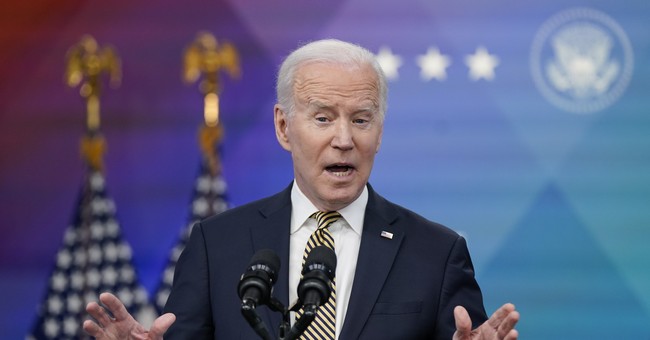WSJ Columnist Zeroes in on Why the Biden Response to the Ukraine War Is a Mess

If we’re going to do sanctions, let’s do it. Let’s take a hammer to Russia's oil and gas. Let’s target the oligarchs that support and fund the Russian war machine. It’s time to go gung-ho against the Russians. It will hurt us too. The oil imports are going to accelerate the speed at which gas prices rise. They’ve been rising since Joe Biden took a hammer to the Keystone Pipeline in the early days of his failed presidency. We’re not going to go to war with Russia over this, though World War III is increasingly becoming the bipartisan consensus here which is frightening. Yet, if you’re wondering why the US response still seems slow and paralyzed by analysis despite a tranche of sanctions, then you’ll be shocked (not really) to find out that Biden is slow-walking something because he doesn’t want to make Europe mad. It’s Obama 2.0. Obama’s Syrian policy was like Han Solo frozen in carbonite. It laid out two things that were simply not going to happen. With Russia in the region, Bashar al-Assad was not going anywhere. Russia and Assad were buddies. So, we just dithered. Even when Assad used chemical weapons and crossed that ‘red line,’ Obama did nothing, preferring to wallow in the quicksand of multilateralism.
That’s what’s happening here. Joe needs the green light from Old Europe which is reportedly causing friction between the White House and Congress. A recent op-ed by The Wall Street Journal’s Kimberley Strassel dissects the Biden approach as the world deals with the Russian invasion of Ukraine. It’s a Potemkin village. If the narrative Biden is trying to portray is an America that is back and leading the free world on delivering the response to this Ukraine war, it’s a Potemkin village at its core. How can it be when we’re leading from 45 rows behind? As Strassel noted, on the sanctions front, the European Union has done more than we have. On preferred trading status, Biden wants Congress to hold off. Congress is ignoring Biden which could set up a showdown. Also, the sanctions on Russian oil imports don’t go into effect until late June. Why is there a months-long delay? Oh, here comes that M-word (via WSJ) [emphasis mine]:
The administration refused to impose sanctions in the lead-up to Mr. Putin’s invasion, naively trusting diplomacy. Yet even after Russian tanks rolled—and despite having months to prepare—the response has been slow, timid, hostage to feel-good “multilateralism” and unwilling to attack the real engine of the Russian economy: energy. Even the president’s own party is losing patience with his inadequate sanctions.
Consider that Treasury announcement. In late February Mr. Biden grandly announced sanctions targeting Russian banks. Yet … Treasury quietly clarified that the sanctions won’t apply to the banks’ energy transactions until June 24—meaning Wall Street can continue to trade in Russian oil and gas. “The energy sector of the Russian Federation economy itself is not subject to comprehensive sanctions,” explained Treasury’s website, a scandalous caveat the media largely ignored.
Sen. Rob Portman on Tuesday asked Undersecretary of State Victoria Nuland to justify the decision to give the Russian energy sector a pass for four months. She explained that working “multilaterally” remained the top priority, so “we did agree to a phase-in” at the behest of energy-dependent “European allies.”
Mr. Biden … belatedly announced a ban on Russian oil and gas—but only because congressional Democrats and Republicans were uniting to pass legislation forcing his hand. Even Speaker Nancy Pelosi supported the ban and reportedly refused to agree to a White House demand to drop it. The Biden team scrambled to get ahead of Congress by announcing the embargo itself.
The White House has also demanded congressional Democrats stand down on a bipartisan bill that would suspend Russia’s preferential trading status with the U.S.—again, seemingly in order to discuss it to death with Europe. The good news is that lawmakers in both parties said late this week that they remain undeterred and may pass the trade restriction next week—potentially forcing Mr. Biden’s hand again.
The White House is nonetheless getting its way when it comes to blocking a Republican bill from Sen. Jim Risch that would impose real sanctions on Russia’s oil, gas, mining and mineral sectors. It targets oligarchs. It would create a lend-lease program to ensure Ukraine will continue to get necessary military resources. Crucially, it provides for “secondary sanctions” against global institutions that finance the Russian economy. As Mr. Risch notes, these secondary sanctions would “force the world’s financial institutions to make a choice between Russia and Western markets” and finally “isolate” the Russian economy.
The White House is resisting all this for the same reason it resisted the Russian oil embargo. Truly punishing sanctions against Russia’s energy sector are still anathema to Old Europe allies who want to continue importing Russian oil. The administration also fears that seriously targeting Russian energy would further drive up gasoline prices, hurting Mr. Biden domestically.
Biden is presiding over divided fronts at home and abroad in Russia. Poland was ready to deliver MiG fighters to Ukraine. Secretary of State Antony Blinken said they had the green light. They don’t. Biden is putting the kibosh on that, which only adds to the ongoing narrative that this administration is a chicken with its head cut off. America looks adrift and wholly unreliable to provide the leadership necessary for this crisis. Poland’s bold announcement on the fighter jets was a secondary protocol move. They know the US under Biden is a flaky partner. We’re not doing some things because of…Europe. I get the Democrats’ incessant need to ‘not look like Bush’ but this is absurd. Europe and the Ukrainians are leading the world right now, not us. It may never be that way under this president and how his people operate.
